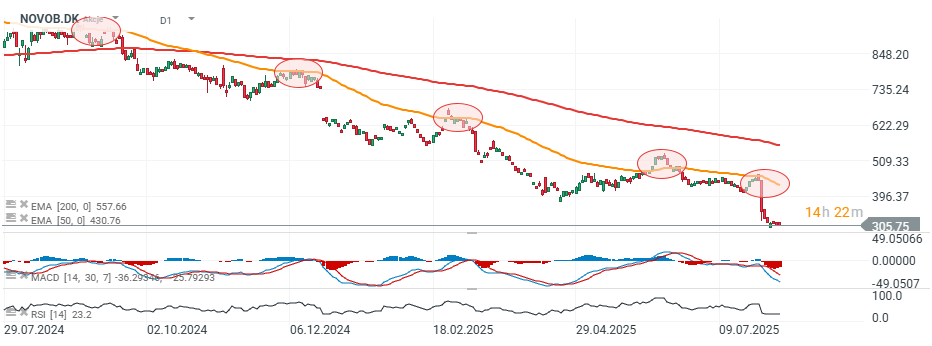Shares of Danish pharmaceutical company Novo Nordisk (NOVOB.DK), known for its treatments targeting obesity and diabetes, opened slightly higher following the release of its quarterly results but quickly reversed course. As of now, the stock is down nearly 1%. Sales of Wegovy slightly exceeded market expectations, coming in at DKK 19.53 billion versus the projected DKK 19.2 billion. Novo Nordisk also unveiled a new corporate strategy focused on enhancing commercial execution and reducing costs.
- The company, which in 2024 was Europe’s most valuable publicly listed firm with a peak market capitalization of approximately $650 billion, is now facing mounting competitive pressures and legal loopholes that are enabling generic alternatives. Its market value has since dropped to roughly $212 billion.
- Despite these challenges, Novo Nordisk has reaffirmed its full-year guidance. Just days ago, the company cut its 2025 sales growth forecast, citing slower-than-anticipated expansion and deepening market headwinds. The updated projection for 2025 now stands at a reduced range of 8% to 14%, compared to the earlier outlook of 13% to 21%. This marks the second downward revision this year.
Q2 Financial Highlights
-
Revenue reached DKK 76.86 billion (~$11.92 billion), reflecting an 18% year-over-year increase, though it fell short of analyst estimates.
-
EBIT (Earnings Before Interest and Tax) came in at DKK 33.45 billion, a 29% increase compared to the same period last year.
U.S. rival Eli Lilly continues to gain ground in the weight-loss treatment space, advancing its own portfolio of GLP-1-based therapies. This growing competition has eroded Novo’s dominance and narrowed its pricing power. Although U.S. FDA regulations prohibit the replication of patented drugs, compounding pharmacies have been able to produce modified versions of Wegovy and Ozempic for custom prescriptions. These compounded alternatives, while technically legal in certain circumstances, undermine Novo Nordisk’s market exclusivity.
Strategic Moves
Novo Nordisk has announced a revised strategic plan aimed at boosting commercial effectiveness and streamlining operational expenses. The announcement follows a turbulent week in which the company issued a profit warning and unexpectedly replaced its long-serving CEO—developments that contributed to a dramatic $95 billion drop in market capitalization.
- Maziar Mike Doustdar, a long-time executive within the company, is set to officially assume the role of CEO on Thursday. He replaces Lars Fruergaard Jorgensen, who led the company for over seven years.
- The new strategy places greater emphasis on cost discipline and operational agility, while continuing to support long-term investment in research, development, and growth initiatives.
- Sales of GLP-1 drugs Wegovy and Ozempic are increasingly threatened by compounded formulations produced by U.S. pharmacies—a workaround to existing patent protections that poses a strategic risk to Novo’s product leadership.
In a statement to shareholders, outgoing CEO Jorgensen emphasized the need to “sharpen commercial execution” and maintain financial flexibility to secure leadership in the increasingly competitive obesity and diabetes treatment market. Under new leadership, Novo Nordisk’s ability to defend its market share amid regulatory, legal, and pricing challenges will be put to the test. Investors are now awaiting clearer signals regarding Doustdar’s strategic vision and the company's next steps in navigating the volatile market ahead.
Novo Nordisk Stock (NOVOB.DK, D1 interval)
The company’s stock has declined from a high near DKK 900 to around DKK 305 today—a record plunge in its history. Behind the downturn lies intensifying competition in the GLP-1 drug segment and increasingly demanding valuation levels that the company reached in 2024. Shares currently trade at a price-to-earnings (P/E) ratio of approximately 14x, a level that may appear conservative by historical standards for Novo, but is roughly in line with the broader pharmaceutical sector average. On the other hand, at current situation, the Novo's business growth is not much faster than average for big and profitable pharma companies. On Tuesday, UBS analysts downgraded the stock to ‘neutral’, citing intensified competition. Novo is not only facing pressure from Eli Lilly’s Zepbound but also from a growing number of unofficial generic substitutes, which further undermine its position in the global market.
Source: xStation5
End of Zillow? Google enters another market.
US OPEN: Mild optimism at the start of the week
Sanofi Under Pressure After FDA Delay and Failed Trials
Rivian Automotive: Rising star or a meteorite?
The material on this page does not constitute as financial advice and does not take into account your level of understanding, investment objectives, financial situation or any other particular needs.
All the information provided, including opinions, market research, mathematical results and technical analyses published on the website or transmitted to you by other means is provided for information purposes only and should in no event be interpreted as an offer of, or solicitation for, a transaction in any financial instrument, nor should the information provided be construed as advice of legal or fiscal nature.
Any investment decisions you make shall be based exclusively on your level of understanding, investment objectives, financial situation or any other particular needs. Any decision to act on information published on the website or transmitted to you by other means is entirely at your own risk. You are solely responsible for such decisions.
If you are in doubt or are not sure that you understand a particular product, instrument, service, or transaction, you should seek professional or legal advice before trading.
Investing in OTC Derivatives carries a high degree of risk, as they are leveraged based products and often small movements in the market could lead to much larger movements in the value of your investment and this could work against you or for you. Please ensure that you fully understand the risks involved, taking into account your investments objectives and level of experience, before trading, and if necessary, seek independent advice.


